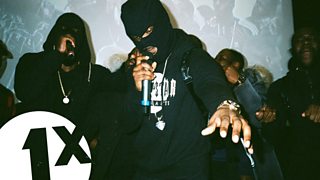Music not gang culture: how drill can help young people

By Ian McQuaid, 29 May 2018
The past few months have seen an increase in the media focus on the UK drill scene. Newspapers have devoted pages of reporting on the genre, often with varying levels of research, knowledge and access.
Drill can appear an easy target - it’s a genre made by and for people with almost zero influence in the mainstream media
Drill can appear an easy target - it’s a genre made by and for people with almost zero influence in the mainstream media. As such they have little opportunity to counter negative narratives built around them. In fact, it’s difficult to find an article written that doesn’t link the music to violence.
Like countless youth music movements before, from the blues to punk to grime, drill lyrics deal with controversial issues. Born in the harsh landscape of inner city Chicago, and chiming with kids growing up in London’s sink estates, there's heated debate over whether drill simply reflects the realities of living in places where hardship seeps into every aspect of daily life, or whether it glamorises gang culture.
Flipping the script
Music has long been a commentary on social ills and, in new Radio 1 documentary Gangs, Drill and Prayer, Kenny Allstar flips the script surrounding the reporting of drill music on its head. What if, the doc asks, drill isn’t the catalyst of violence in London, but instead a way of curing it? A group like Hope Dealers overtly use the drill flow to offer Christian messages, preaching biblical ideologies in flows that are proudly influenced by the likes of artists Headie One and K-Trap.
However, while the Hope Dealers are openly trying to subvert drill’s often violent message, some would argue that the music itself does not need to be specifically Christian to have real value.
Record label and management company Finesse Foreva work with a variety of acts, covering bashment, RnB, afrobeat and drill. Their roster varies; from the hotly tipped Skengdo x AM, who can sell out a UK tour in twenty four hours, right through to the hungry next generation - MCs such as TFace, Ice City affiliate Q2T and Zone 2’s Kwengface.
-
![]()
Radio 1 Stories: Gangs, Drill and Prayer
Spitting holy bars. The journey of Enrique - gang member to pastor, at 21 years old. From the streets to God, via drill - the music genre increasingly linked to London knife crime.
"What do you have to live for?"
Finesse Foreva co-founder SK points out that the artists that pass through their studio use music as a much needed release valve from the pressure they exist under. “People come and spit what’s inside of them on the track. There’s a lot of pain and emotion that’s going through their head, you can hear the pain in the flow, hear they wanna change, they’re saying this is what I’m living right here and now. I’d rather they let it out on the beat and not the streets.”
You can hear the pain in the flow, hear they wanna change, they’re saying this is what I’m living right here and now. I’d rather they let it out on the beat and not the streetsFinesse Foreva co-founder SK
“People need to understand where these kids are coming from, no one asks why they’re rapping about this – we ask the question why. When we meet a kid doing drill we ask them ‘what do you have to live for?’ And some of the time they don’t even have an answer… Such young boys, 15, 16, 17 with nothing to live for; no job, no family, nothing. But when they get told they’re good, they think, ‘people actually care about me’, they have something to live for. Most of these kids have nothing to live for – if you take away their music they’ll be so much worse.”
SK explains that drill MCs end up moving away from violent lyrics as their world expands, either through success with music, or simply through discovering some sense of self-worth. But during that period before they move away from spitting about the traumas of inner city life, the question that is repeatedly being asked – by fans who know the music well as by media cynics – is, do the violent lyrics contribute to real life violence?
SK is emphatic in his response: “No matter what, the violence is not from the lyrics. Without the lyrics you wouldn’t know what’s going on, but it would still be going on! People are dying out here for real reasons, not for songs. If people were dying for lyrics it’d be world war out here.”
The future
A statistic often repeated in the case against drill is that murder figures in London are reaching alarming new levels. Arguably, blaming drill for systemic social problems tied to complex economic issues is going to do little to improve anything. In which case, what should the government be doing?
“They need to come down to these communities,” SK concludes, “and see what’s actually going on. Jail is no deterrent. People are afraid of having nothing. And they interpret that fear as violence. They should be empowering people in the communities to make a difference. We’re self-funded, we have so many ideas on how to reduce the violence, on how to give people opportunities. We try and make the studio a home for everyone."
"It’s hard at times, you have to make the kids understand and respect the space – they can relate to what we’re trying to do. It’s like a break for them from how they’re living, they’re not worrying about beefing my man. We want the best for them – they may not make it in music, but we try and make them understand that they might be able to use their skill for something else, whatever area.”
Perhaps the future is not so bleak after all. With movements like Hope Dealers and Finesse Foreva trying to change the conversation around drill, the music may yet be viewed with the same respect, appreciation and nuance that grime currently enjoys.
Watch the documentary - Radio 1 Stories: Gangs, Drill and Prayer


